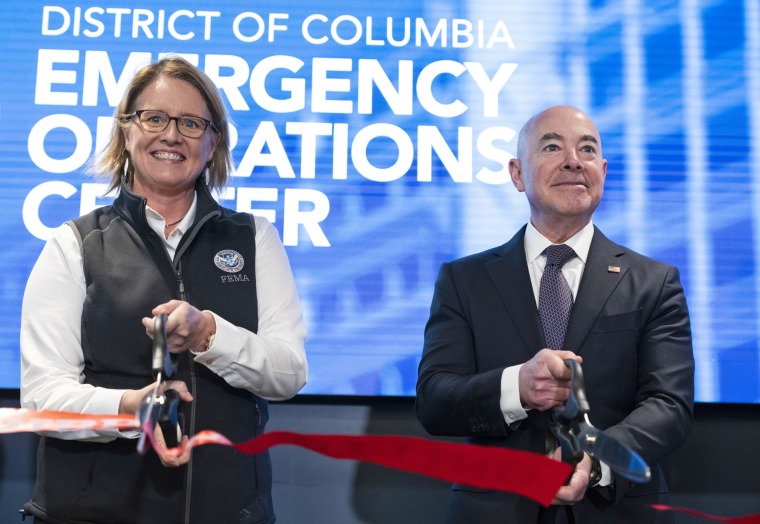Local and federal officials on Monday announced the opening of a law enforcement center in downtown Washington that is designed to better prepare law enforcement for the next public health emergency or Jan. 6-style attack.
“We have learned a lot from the past three years,” D.C. Mayor Muriel Bowser said at a ribbon-cutting for the Emergency Operations Center, in Southeast Washington. “Be prepared for anything and everything, whether that’s a global pandemic or an emergency at the U.S. Capitol.”
More than two dozen law enforcement agencies, including staff from the FBI, Secret Service, the U.S. Park Police, U.S. Capitol Police and D.C.’s Metropolitan Police Department, will occupy the 42,000 square-foot space.
Homeland Security Secretary Alejandro Mayorkas said the Emergency Operation Center will enable DHS to “work seamlessly with our key partners.”
It is not the first time the United States’ capital region has attempted to eliminate obstacles in information sharing by putting all the law enforcement bodies that protect it under one roof.
A previous iteration, known as D.C.’s “fusion center,” shared open sourced data in December 2020 with DHS and D.C.’s Metropolitan Police Department about threats to the region on Jan. 6, 2021, according to a Government Accountability Office report.
Chris Rodriguez, director of the Homeland Security and Emergency Management Agency for the District of Columbia, said the new space is larger, allowing for more federal law enforcement officers to be permanently stationed there and it is better equipped for real-time intelligence sharing.
Screens covering the walls of the new facility will show surveillance cameras around the city as well as social media accounts that may be monitored for threatening speech, a spokeswoman for D.C.'s Homeland Security and Emergency Management Agency said.
“If someone’s seeing something on one of the DDOT cameras, they can turn to an intel analyst and say, ‘We have something going on,’” Rodriguez said.
Rodriguez said one of the challenges of Jan. 6, 2021, was that there was no coordinated response to tell members of outside police departments where to go when they arrived to help in D.C.
“If we’re getting calls from the New Jersey State Police, which we did, and they’re on their way down I-95, ‘Where are they going? Who are they reporting to?’ We didn’t have some of those granular answers because we didn’t have the right people in (the building) and we didn’t have access to any of the data,” Rodriguez said.
Personnel from the White House’s National Security Office and the D.C. National Guard have also been invited to participate in the new center, Rodriguez said.
Limits in the D.C. mayor’s authority to call on the National Guard were laid bare on Jan. 6, as Bowser tried to request help six times that day but was rebuffed by the House sergeant-at-arms, according to congressional testimony from former U.S. Capitol Police Chief Steven Sund, who resigned after the attack.
The House Select Committee investigating the Jan. 6 attack laid most of its blame on former President Donald Trump for encouraging an angry mob to attack the Capitol and fueling conspiracy theories that the election was rigged and that he was the rightful winner of the 2020 presidential election.
Former federal prosecutor Tim Heaphy, the committee’s chief investigative counsel, previously told NBC News that while Trump was the “proximate cause” of what transpired on Jan. 6, “law enforcement had a very direct role in contributing to the security failures that led to that violence.”
The new Emergency Operations Center is expected to be fully staffed in time for the Fourth of July.

